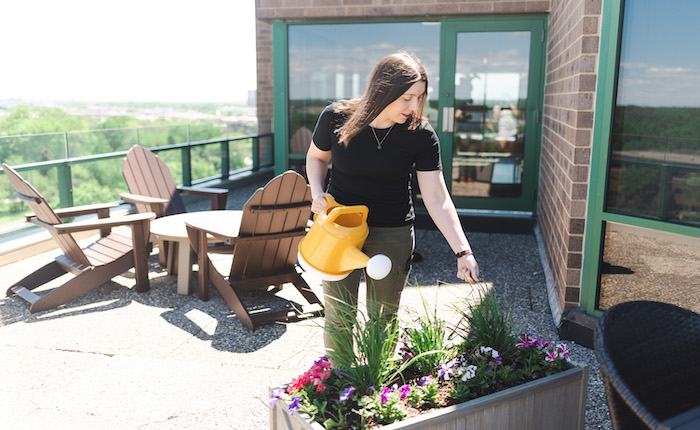The Bellmont Partners Sustainability Committee aims to reduce the waste associated with running our business and improve the world around us, as well as educate, encourage and empower employees on various environment-related topics and activities. At our monthly staff meetings, we offer sustainability tips for our team to use both at the office and in their daily lives.
1. Use cold water when you wash clothes. When you can, wash your clothes in cold water. Your washing machine’s energy consumption comes almost exclusively from heating the water. It can also extend the life of your clothes. But make sure to check the label before washing. Check out more information from GE Appliances.
2. Do not put your recyclables in plastic bags or put any loose plastic bags in your recycling bin. Plastic bags get caught in the sorting equipment at recycling facilities, causing damage and safety issues. If you are set on using a recycling bin liner, there are options for non-plastic bags:
- Use a paper grocery bag
- For taller containers, you can use paper leaf and lawn collection bags
- If you want something to protect from liquids, you can use a plastic bag liner, but empty the plastic bag into your recycling collection bin and re-use the plastic bag until you can’t (and then throw it in the trash).
For any extra plastic bags you need to get rid of, there are many places that collect plastic bags so you don’t have to throw them in the trash. PlasticFilmRecycling.org can help you find the closest drop-off site to your house. The results are often grocery stores, Target stores and even local libraries, along with county-run drop-off sites.
3. Keep your food as fresh as possible to reduce food waste. Improperly storing fruits and vegetables can ripen them prematurely, causing them to spoil before being eaten. For example: potatoes, tomatoes, garlic, cucumbers and onions should be kept at room temperature and never refrigerated.
According to the United States Department of Agriculture, an estimated 30–40% of food is wasted at the retail and consumer level. UC- San Diego has a good graphic about ethylene and food storage from the University of San Diego School of Medicine Center for Community Health.
4. Be a battery hero. Put batteries in their place. Batteries thrown in the trash or recycling can get punctured or crushed and cause fires at waste facilities. To find a drop-off location, visit:
co.washington.mn.us/batteries | hennepin.us/batteryrecycling | ramseycounty.us/HHW.
5. Unsubscribe from promotional emails. This will reduce opportunities for mindless consumption and temptations to buy items when they’re not needed. Your inbox – and your wallet – will thank you.
There are many ways to create a sustainable and environmentally friendly workplace, and all voices are welcome at the table. It’s important to remember that you don’t have to be perfect when it comes to green living. But small efforts can add up to make a big impact. Keep doing the small things.
Do you have a great sustainability tip? Share it with us at johanna@bellmontpartners.com.

